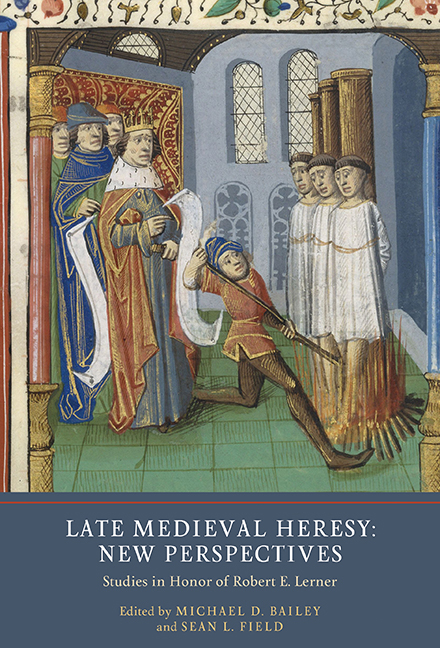Book contents
- Frontmatter
- Contents
- Preface: Robert E. Lerner: A Portrait
- List of Contributors
- Introduction: Historiography, Methodology, and Manuscripts: Robert E. Lerner and the Study of Late Medieval Heresy
- 1 The Heresy of the Templars and the Dream of a French Inquisition
- 2 The Dissemination of Barthélemy Sicard's Postilla super Danielem
- 3 Magic, Mysticism, and Heresy in the Early Fourteenth Century
- 4 The Making of a Heretic: Pope John XXII's Campaign against Louis of Bavaria
- 5 Unusual Choices: The Unique Heresy of Limoux Negre
- 6 Princely Poverty: Louis of Durazzo, Dynastic Politics, and Heresy in Fourteenth-Century Naples
- 7 Disentangling Heretics, Jews, and Muslims: Imagining Infidels in Late Medieval Pastoral Manuals
- 8 New Frontiers in the Late Medieval Reception of a Heretical Text: The Implications of Two New Latin Copies of Marguerite Porete's Mirror of Simple Souls
- 9 Disputing Prophetic Thought: The 1466 Questio quodlibetalis of Johannes of Dorsten
- 10 Heretics, Allies, Exemplary Christians: Latin Views of Ethiopian Orthodox in the Late Middle Ages
- 11 ‘By them in reality I meant the Jews’: Medieval Heretics in the Work and Life of Renate Riemeck (1920–2003)
- Afterword: Who or What Was a Heretic in the Late Middle Ages?
- Robert E. Lerner: A Chronological Bibliography
- Index
- York Medieval Press: Publications
5 - Unusual Choices: The Unique Heresy of Limoux Negre
Published online by Cambridge University Press: 14 June 2019
- Frontmatter
- Contents
- Preface: Robert E. Lerner: A Portrait
- List of Contributors
- Introduction: Historiography, Methodology, and Manuscripts: Robert E. Lerner and the Study of Late Medieval Heresy
- 1 The Heresy of the Templars and the Dream of a French Inquisition
- 2 The Dissemination of Barthélemy Sicard's Postilla super Danielem
- 3 Magic, Mysticism, and Heresy in the Early Fourteenth Century
- 4 The Making of a Heretic: Pope John XXII's Campaign against Louis of Bavaria
- 5 Unusual Choices: The Unique Heresy of Limoux Negre
- 6 Princely Poverty: Louis of Durazzo, Dynastic Politics, and Heresy in Fourteenth-Century Naples
- 7 Disentangling Heretics, Jews, and Muslims: Imagining Infidels in Late Medieval Pastoral Manuals
- 8 New Frontiers in the Late Medieval Reception of a Heretical Text: The Implications of Two New Latin Copies of Marguerite Porete's Mirror of Simple Souls
- 9 Disputing Prophetic Thought: The 1466 Questio quodlibetalis of Johannes of Dorsten
- 10 Heretics, Allies, Exemplary Christians: Latin Views of Ethiopian Orthodox in the Late Middle Ages
- 11 ‘By them in reality I meant the Jews’: Medieval Heretics in the Work and Life of Renate Riemeck (1920–2003)
- Afterword: Who or What Was a Heretic in the Late Middle Ages?
- Robert E. Lerner: A Chronological Bibliography
- Index
- York Medieval Press: Publications
Summary
The word ‘heresy’ literally means choice. Instead of accepting the received wisdom of the Church, the heretic has chosen an alternate path. As Robert Grosseteste famously stated, ‘heresy is an opinion chosen by human perception contrary to Holy Scripture, publicly avowed and obstinately defended’.
While every heretic ultimately makes an individual choice, historians have privileged the study of movements, frequently led by charismatic individuals. Valdes of Lyon, Peter John Olivi, John Wyclif, and Jan Hus all made unorthodox choices in Biblical and theological interpretation, and the Poor Men of Lyon, Beguins, Lollards, and Hussites joined them in their ideological rebellions against the Church. Our understanding of late medieval heresy is incomplete, however, if we do not allow space for the lone individual who made heretical choices on his or her own, choices that may not have resulted in the creation of a movement. Because it was not possible for the inquisitors who questioned and judged them to place them into pre-existing categories, the documentation for such people can be more ample than is common for members of movements. These so-called ‘normal exceptions’ of microhistory present rewarding opportunities to explore the motivations and inspirations of all those whose individual choices might otherwise be lost to history.
Limoux Negre (Limosus Nigri) is an example of this second kind of choicemaker. When he had appeared in Bishop Bartomieu's court in Alet-les-Bains in April 1326, summoned to answer questions about the sacraments and most especially the Eucharist, the bishop at first dismissed him, referring to his statements as mere ‘stories’ (fabulas). The content of his testimony is indeed highly original, with fantastical imagery and unusual rejections of orthodox doctrine. Someone denounced him a second time, however, and the bishop of Alet sent Limoux to the inquisitors of Carcassonne, Jean Duprat and Henri de Chamayou, who questioned him over a period of approximately three years before burning him as a ‘pertinacious and obstinate heretic’ in Carcassonne on 10 September 1329. He did not recant. The sole document we have about Limoux is the three thousand-word culpa (fault), which would have been redacted from his testimony in order to be read at the General Sermon where he was sentenced. It survives in Bibliotheque nationale de France, MS Doat 27, fols. 216r–225r, a seventeenth-century transcription of register GGG of the Carcassonne inquisition.
- Type
- Chapter
- Information
- Late Medieval Heresy: New PerspectivesStudies in Honor of Robert E. Lerner, pp. 96 - 115Publisher: Boydell & BrewerPrint publication year: 2018



